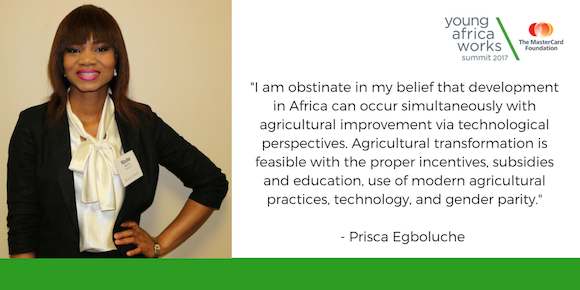
My name is Prisca Egboluche from Nigeria. I am a MasterCard Foundation graduate scholar in the Department of Plant, Soil and Microbial Sciences at Michigan State University (MSU), in the United States. I am also an Igbo language instructor in the Department of Linguistic and Germanic, Slavic, Asian and African Languages, MSU. I am an avid researcher, a young entrepreneur and a dedicated teacher with an open mind.

My name is Prisca Egboluche from Nigeria. I am a MasterCard Foundation graduate scholar in the Department of Plant, Soil and Microbial Sciences at Michigan State University (MSU), in the United States. I am also an Igbo language instructor in the Department of Linguistic and Germanic, Slavic, Asian and African Languages, MSU. I am an avid researcher, a young entrepreneur and a dedicated teacher with an open mind.
My research focuses on agriculture; specifically, soil conservation research. I am particularly interested in soil research related to soil organic matter and nutrient cycling through microbial perspectives. My passion is to ensure food security in my country and in Africa at large through improving soil quality and fertility levels.
As a child, I grew up in a rural community where most of the people are small-scale farmers. I would accompany my parents to our farm on weekends and during holidays, and over time, I developed a keen interest in agriculture. I remember a particularly bleak year when we endured poor crop yield. I was nine years old.
The following year, we added soil enrichments and poultry droppings, which resulted in a boom! My little mind was instantly drawn to this ‘miracle’ that had occurred. The poor crop yield due to a decline in soil fertility and probably other factors tugged at my heart. The desire to help farmers manage soil fertility propelled me to study Soil Science at the University of Nigeria, Nsukka, with a focus on maintaining soil fertility using organic manure.
I had the opportunity to put my learnings into practice during my two-month internship in the communities surrounding Kibale National Park in Uganda. These communities are experiencing a decline in soil fertility levels due to over-cultivation, so my aim was to help farmers boost their soil fertility levels for a sustainable increase in yields.
After interviewing the farmers there, I observed that 95% of them added little to nothing to their farms to boost fertility levels. The few that kept farm records experienced year-to-year declines in yield. I also broadened my knowledge of some challenges faced by these farmers, including gender-related issues, lack of extension agents and lack of education, a dearth of technical know-how, cultural influences and wildlife attacks on their crops.
With these challenges in mind, I carried out extension services in the communities, educating them on the benefits of compost and how to make good quality compost, and some agricultural practices such as application of the right amount of organic and inorganic fertilizers at the right time to ensure high crop yield. Also, I taught them how to make trenches and how to effectively cultivate tea at the edge of their farms to prevent wildlife attacks.
What I have come to believe through my experiences is that Africa really needs a transformation in agriculture: a shift away from the use of local implements and highly diversified, small-scale crop production, toward a technology-driven, highly specialized, large-scale, market-driven system. Self-sufficiency and food security are the cornerstones of any modern society and the need for both in Africa is quite glaring.
I wish to be part of this transformation. I aspire to build a career that includes providing technical support and advisory services to agro-businesses, agricultural organizations and governments on matters of soil fertility, resource management and control. I also intend to create an organization that helps farmers form groups where they can learn new and modern practices in agriculture. In addition to those plans, I also hope to establish a crop and animal farm in Nigeria that will create employment for the youth in my immediate community, and allow for experimenting with different agricultural practices.
Last, I would like to be a professor in the field of soil sciences and establish a soil science laboratory with a mentoring program that trains young women in sciences to bridge the wide gap that exists between women and men. My ideas may sound quixotic but I am dedicated to achieving them all. This way I can provide modern professional assistance in the field of soil science, and help farmers in Africa strike a balance between economic sustenance and environmental resources management and maintenance.
Therefore, I am obstinate in my belief that development in Africa can occur simultaneously with agricultural improvement via technological perspectives. Agricultural transformation is feasible with the proper incentives, subsidies and education, use of modern agricultural practices, technology, and gender parity. My time in Uganda made even more apparent the chasm that exists between traditional practices and proven modern practices that increase yield.
I am excited about the upcoming Young Africa Works Summit, because I hope to learn and exchange ideas about ways to transform agriculture in Africa and how to engage the youth in the agricultural sector. Just to be around people who are as passionate as myself about agriculture and the roles of technology and gender in it, is truly inspiring and I look forward to it. As the French Philosopher Victor Hugo said, “Nothing is more powerful than an idea whose time has come.”
Find the original blogpost on the Young Africa Works website.
This blogpost by Nzube Prisca Egboluche is part of a blog series on the Young Africa Works Summit in Kigali, Rwanda on February 16-17. YPARD will be conducting a one day pre-Summit workshop and a mentoring program to build on the youth delegates communication and networking skills in preparation for their participation at the Summit.For more information about the Summit visit the youngafricaworks.org website.
Photo courtesy: Young Africa Works

